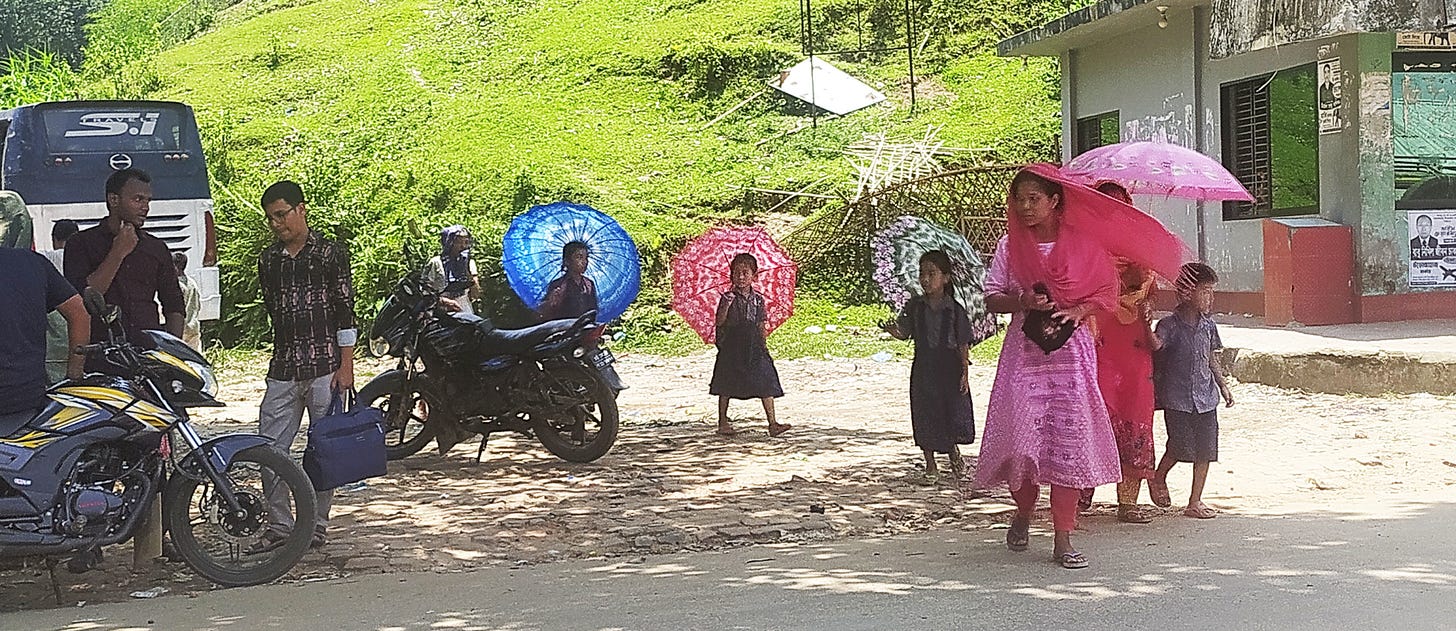Kids and climate! Back-to-school edition
Empowering climate education, heatwaves and misinformation, and reducing school emissions
GOOD NEWS
Kids will be heading back to school soon, and it’s inspiring to see them taking charge and coming up with creative new climate solutions - and adults giving them the space and resources to do so!
In Indiana, for example, two teachers (including Kirstin Milks, PhD, whose story is in my book Saving Us), two scientists and an education specialist teamed up to create the Climate Engineering Teaching Module. It helps students develop and apply their critical thinking and problem-solving skills to climate. One lesson inspired high school freshman Dwayne Murphy to take old technology from steam engines and modify it to provide a clean energy way to power a car. Other students came up with ideas for solar helicopters and artificial trees.
That’s why it is more important than ever that climate change is taught in classrooms. “The time is now to include climate education as a key climate risk mitigation strategy — along with energy transformation, land uses and water — and to make climate education a mandatory part of the national curriculum,” said Radhika Iyengar of the Columbia Climate School’s Center for Sustainable Development.
Organizations like Planet Ed, which is pushing for collective action on climate change in children’s media, early childhood, K-12 education, and higher education, are crucial to speeding this up. That’s why I co-chair their climate task force and helped craft the four simple messages their materials focus on: (1) Earth is our home, (2) it’s getting hotter because of us, (3) climate is changing now and it’s impacting us, and (4) together, we can make the changes we need for a brighter future.
NOT-SO-GOOD NEWS

Around the world, many schools don’t have air conditioning. This includes some schools in North America, particularly those in older buildings. As heatwaves become stronger and more frequent, schools are closing when the classrooms become too hot to safely educate students there. Losing instructional time is bad for students and parents alike.
Despite the risks climate change poses to students, in the U.S. some states are moving in the wrong direction. In Florida, the state Department of Education has approved using climate denial videos from PragerU, a well-known font of disinformation, in the state’s public schools. (Curious about these videos? In this article, Kristina Dahl from the Union of Concerned Scientists fact-checks one of them.)
Then, this past May, Florida’s Governor DeSantis signed a bill that removes most mentions of climate change from state law. (That bill also prioritizes natural gas use and bans offshore wind installations.) Now, state education officials are reaching out to textbook companies asking them to remove references to climate change. As climate impacts on Florida escalate, this puts everyone at risk.
WHAT YOU CAN DO
Public schools have a big climate footprint. In the US alone, they operate nearly half a million buses and serve some 7 billion meals to students each year.
There are many ways schools can cut their carbon footprint and save money, from installing solar panels on their campuses to switching to heat pumps from gas and oil furnaces. But the majority of school districts still lack the very first step - a climate action plan.
How can you help? Raise your voice! Attend your local school board meeting and recommend action. Talk to school leaders about the importance of addressing climate change. Need talking points? We’ve got a lot of them over at Science Moms!
Encourage students to raise the issue of climate change in school, and have their classmates write letters to the school board about the need to act. WWF-UK has developed climate change resources for secondary school students and teachers that help educate kids and empower them to take action - find them here.




Love that you are covering back to school! I just posted "Let's Celebrate The Climate Initiative" about a summer retreat for teachers where I presented a workshop. Is there a way we can cross post or guest post on each other's sites---I think my audience and yours would be interested in the same things....thoughts?
This is a great piece, and agree the 'kids are alright!' Whenever I do climate tabling, I'm always floored by talking to a local high schooler or two who are taking action. Also babysat my nephew this week and am excited for his little creative genius to join the climate conversation (though he's more interested in blocks right now... :D )